Darfur counts human costs of war
A preliminary inventory conducted by the Ministry of Social Welfare in North Darfur shows that the number of disabled people in Tawila locality has risen to 511 as a result of the war.
 A blind student in Sudan (Albert González / Unamid)
A blind student in Sudan (Albert González / Unamid)
A preliminary inventory conducted by the Ministry of Social Welfare in North Darfur shows that the number of disabled people in Tawila locality has risen to 511 as a result of the war.
Abdelaziz Adoma, a disabled person from Argo camp and a social researcher working for the Ministry of Social Welfare, told Radio Dabanga that the inventory targeted disabled people living in the Rwanda, Argo, Dabanaira, and Borgo camps in Tawila locality from 2013 to 2020. 71 boys, 52 girls, 116 women, and 272 men were found.
One of the main causes for the disabilities are amputations of legs or hands as a result of explosions of mines, unexploded ordnances (UXOs), and barrel bombs dropped by aeroplanes. Another cause is injuries sustained during raids of militia and government forces: shot wounds by (stray) bullets, and deafness, blindness, and paralysis as a result of beatings on the head.
The inventory does not include people with disabilities in other areas of the locality, notably Tabit, Dubo El Omda, Tabara, and Tarnei.
Adoma said that the Swedish International Childhood Care has provided five wheel chairs for basic school students with disabilities.
He appealed to humanitarian organisations and people of good will to provide white canes for the blind, motorcycles for the amputees, trainings to raise the capabilities of the handicapped, income-generating projects, computers, and the building of a headquarters for the handicapped.
Radio Dabanga’s editorial independence means that we can continue to provide factual updates about political developments to Sudanese and international actors, educate people about how to avoid outbreaks of infectious diseases, and provide a window to the world for those in all corners of Sudan. Support Radio Dabanga for as little as €2.50, the equivalent of a cup of coffee.












 and then
and then